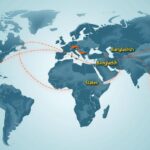Impact of US Tariffs on Bangladesh Exports: Insights from Prof Mustafizur Rahman
Professor Mustafizur Rahman discusses the negative impact of new US tariffs on Bangladesh’s exports and global demand, highlighting potential inflation and economic slowdown in the US. He emphasizes the need for Bangladesh to boost productivity and negotiate with the US regarding tariff calculations and the importance of US cotton in its exports.
Professor Mustafizur Rahman from the Centre for Policy Dialogue stated that the recent tariffs imposed by the Trump administration are not expected to significantly alter market competition. This is primarily because similar tariffs are already in place against Bangladesh’s competitor countries, with some countries facing even higher rates.
He elaborated that the tariffs could lead to increased inflation in the United States and a possible deceleration of economic growth. Consequently, this could diminish demand in the US market, and a potential global trade conflict might further limit worldwide demand, adversely impacting Bangladesh’s export performance.
Professor Rahman emphasized the necessity for Bangladesh to enhance its productivity and actively engage in negotiations with the United States to address these tariff concerns. Regarding the US assertion about a 74% tariff on its exports to Bangladesh, he called for clarity on how this figure was calculated, asserting the importance of understanding this calculation.
He highlighted that Bangladesh represented the fifth-largest market for US cotton exports, which incurs no tariff, and also noted that scrap imports from the US are tariff-free. However, he pointed out the discrepancy with the 31% tariff on petroleum gas. He insisted on a need for explanation from the US regarding the cited 74% tariff.
Additionally, he mentioned the US’s provision of special benefits to countries that utilize American commodities in their exports. Given that Bangladesh incorporates US cotton in its apparel manufacturing, he recommended discussing this matter during the Trade and Investment Cooperation Forum Agreement (TICFA) discussions. Furthermore, he proposed that Bangladeshi brands convey to the Trump administration the importance of US cotton in their apparel exports to the United States.
In summary, Professor Mustafizur Rahman highlighted the potential adverse effects of the new US tariffs on global demand and Bangladesh’s exports. He underscored the need for improved productivity and proactive negotiations with the United States, seeking clarity on the tariff calculations. Notably, he pointed out the significance of US cotton in Bangladesh’s apparel industry and the importance of raising this issue in international discussions.
Original Source: www.tbsnews.net








Post Comment